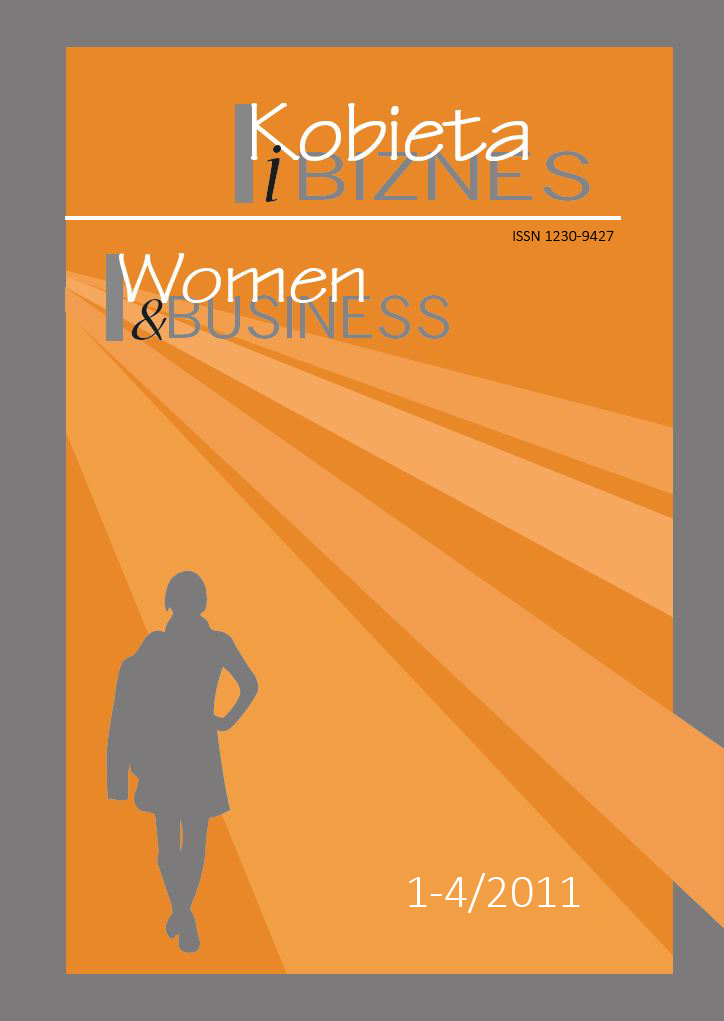Women managers for success 2011 - opportunities and obstacles to women's career path in Poland
Main Article Content
Abstract
The results of this survey, carried out on the basis of the purposive sampling on a group of 193 female managers, revealed a number of substantial issues regarding the situation of Polish women in the business world and the question of their career development. What is important, the conclusions are not only coherent, but also consistent with the results of more extensive studies on the matter. Firstly, success is associated with the ability to realise oneself professionally and to have a satisfying private life at the same time. In terms of their priorities and values, the surveyed female managers are typical representatives of their own social class of educated persons, living in urban areas, who have higher than average level of income. Secondly, the respondents' definition of being successful seems to be the result of the realistic challenges that they face. As the majority of our respondents are working mothers, the biggest obstacle to their career advancement is the difficulty of reconciling professional and family responsibilities. The fact that the respondents, consciously and regardless of their parental status, unanimously indicate the burdening of women with domestic chores as the prime reason for the scarcity of females in the management positions, is also of a great importance. It should be emphasised that the respondents see the bigger picture and recognise the situations when women themselves decide not to pursue career for reasons of their own, such as the costs of trying to balance work and family life, because of their traditional upbringing or due to double social standards. Thirdly, another conclusion drawn from the results of this survey is the fact that the female managers are aware of, and even experience, genderrelated discriminatory treatment in their working environment. The respondents have either fallen victim to, or witnessed incidents of unfair treatment, application of double standards, unequal pay or omitting women in awarding promotions. The surveyed women have also encountered the phenomenon known as the "glass ceiling" and pointed out the absence of female role models in the top management positions. Fourthly, the survey also proved that the respondents build their path towards success by means of constant improvement and through making the factors that depend solely on them - such as strength of character, perseverance, consistency, level of qualifications and accumulated professional experience - work to their advantage. Moreover, the surveyed women managers appreciate the importance of monitoring their own levels of competence, as well as establishing a network of useful professional contacts. Nevertheless, although it might seem that the respondents do everything they can to boost the development of their career, the truly determining factors are outside of their area of influence. Being aware of this fact, the surveyed women identify the solutions for improvement of this situation in a very accurate manner. They want their employers to implement more flexible forms of employment and to guarantee the fair treatment of the female employees. In short, women want a working environment free of any instances of gender discrimination. The government, on the other hand, should support the implementation of flexible forms of employment, ensure better childcare facilities and incorporate awareness-raising initiatives into their long-term policy, such as school curricula that promote equality of men and women. It should be pointed out that our respondents are highly aware of the insufficiency of the current legal anti-discrimination regulations in ensuring women equal prospects of professional advancement. Furthermore, the survey revealed that the respondents appreciate the need for women to support one another in the career development. Even if there is some sort of a female solidarity in the business world, it is not nearly enough. Fortunately, the membership in business organizations and female-exclusive initiatives not only provide better prospects for women to develop their qualifications but also empowers them to pursue their goals with confidence.
Article Details
Authors retain copyright and grant the journal right of first publication with the work simultaneously licensed under a Creative Commons Attribution License that allows others to share the work with an acknowledgement of the work's authorship and initial publication in this journal. All authors agree for publishing their email adresses, affiliations and short bio statements with their articles during the submission process.
Author agrees to share his work under CC-BY-NC license.
References
2. LFS: Labour force survey in Poland, I quarter, 2011, CSO, Warsaw 2011.
3. Catalyst: Lois Joy, Advancing Women Leaders: The Connection Between Women, Board Directors and Women Corporate Officers, Catalyst, Nowy York 2008.
4. CBOS: Co jest ważne, co można, a czego nie wolno - normy i wartości w życiu Polaków, komunikat z badań, Warszawa, lipiec 2010.
5. CBOS: Kobiety w społeczeństwie - równouprawnienie czy dyskryminacja, komunikat z badań, Warszawa, grudzień 2006.
6. Gender Index: Firma równych szans 2007. II edycja konkursu.Raport z badań, red. E. Lisowska, EQUAL, PKPP Lewiatan,Warszawa 2008.
7. Gender Index: Monitorowanie równości kobiet i mężczyzn w miejscu pracy, red. E. Lisowska, EQUAL, UNDP, Warszawa 2007.
8. ILO: Reducing the decent work deficit: A global challenge, Report of the Director General,International Labour Conference,89th Session, ILO, Geneva 2001.
9. Kupczyk T., Kobiety w zarządzaniu i czynniki ich sukcesów,Wyższa Szkoła Handlowa, Wrocław 2009.
10. Lisowska E., Równouprawnienie kobiet i mężczyzn w społeczeństwie, wyd. II, Oficyna Wydawnicza SGH, Warszawa 2010.
11. Mandal E., Kobiecość i męskość. Popularne opinie a badania naukowe, Wyd. Akademickie Żak, Warszawa 2003.
12. Niemczewska M., Mrowiec K., Paterek K., Rola kobiet w innowacyjnej przedsiębiorczości nowych technologii, PARP, Warszawa 2007.
13. Titkow A., Duch-Krzysztoszek D., Budrowska B., Nieodpłatna praca kobiet - mity, realia, perspektywy, Wyd. IfiS PAN,Warszawa 2004.

